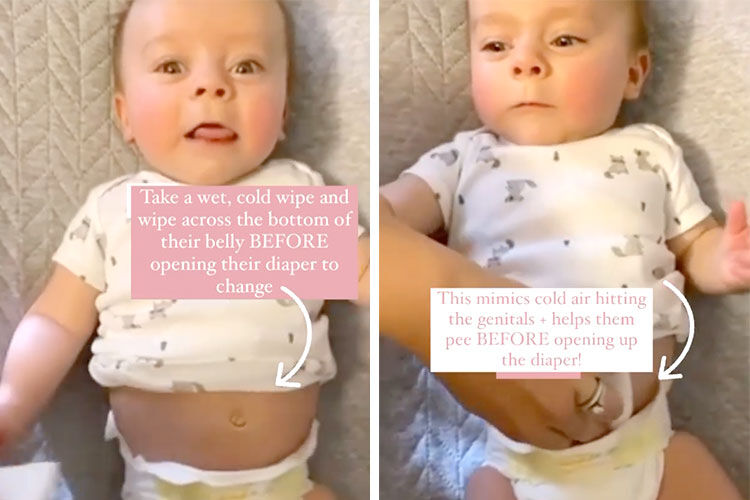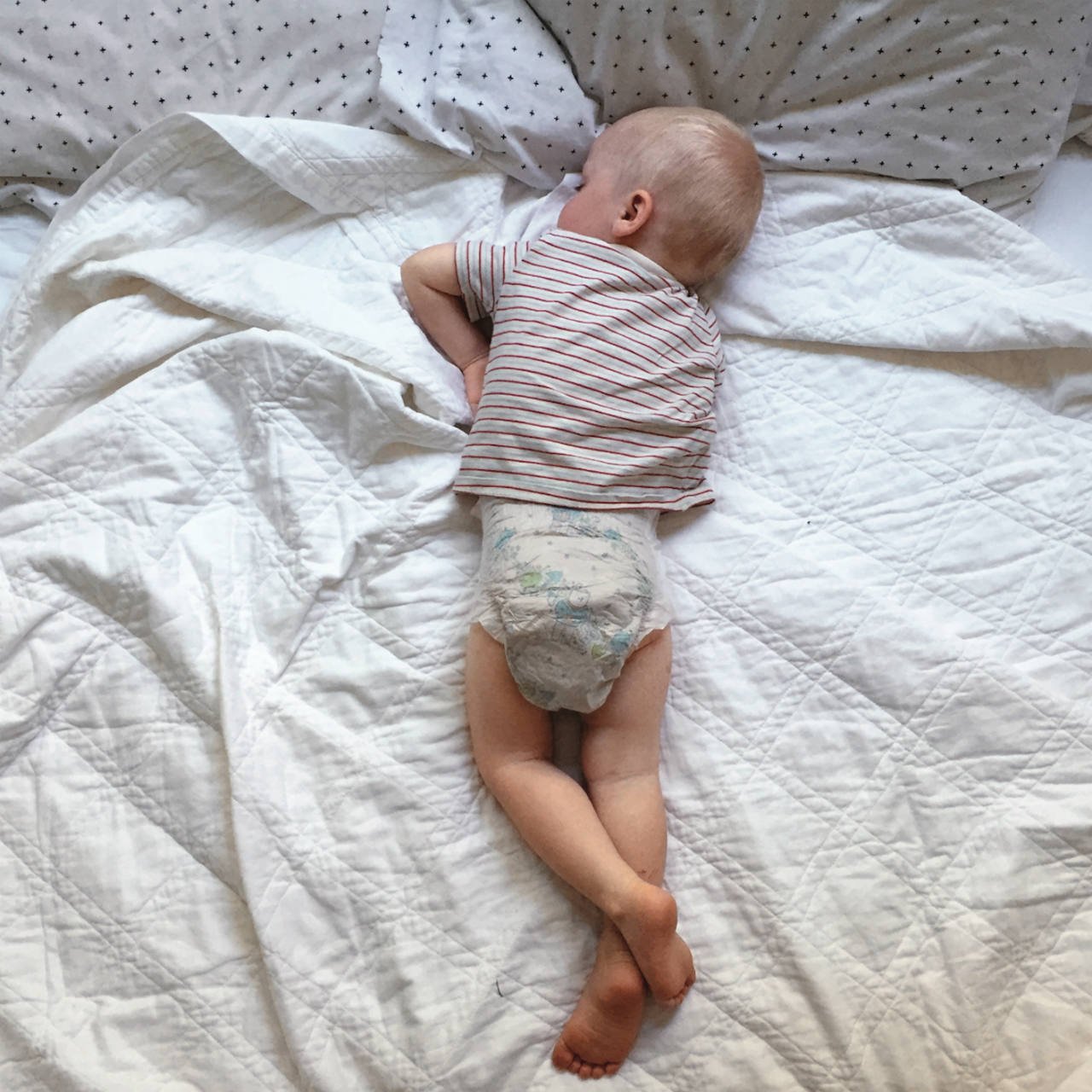To prevent your baby from peeing through their diaper, ensure it’s the right size and correctly fastened. Opt for highly absorbent diapers and consider changing them more frequently.
Dealing with a baby who frequently soaks through their diapers can be quite challenging for parents. A secure, snug fit is crucial to contain your baby’s outputs effectively. Factors like choosing the appropriate diaper size, ensuring proper diaper placement, and considering overnight or high-absorbency options can make all the difference.
Frequent diaper checks and timely changes, especially before bedtime, can significantly reduce leakage incidents. Remember, a baby’s comfort and hygiene are paramount; selecting a quality diaper brand, adjusting fit as they grow, and inspecting for signs of fullness are essential parental habits. These measures improve your child’s well-being while potentially saving you from extra laundry.
Understanding Baby’s Leakage Patterns
Assessing the frequency and timing of leaks requires meticulous observation. Parents should note down specific times and conditions under which their baby seems to be peeing through the diaper. Trends may emerge, such as leaks occurring during specific times of the day or following a heavy feed, which can signal a need for a different diaper usage strategy or a switch in brand or size.
Diaper leaks could be indicative of an ill-fitting diaper. Signs such as gaps around the thighs or waist, frequent blowouts, or a diaper that appears too snug may suggest that the current diaper does not fit properly. Ensuring a snug fit, without being too tight, is crucial to prevent unwanted leakage.
Lastly, parents should consider their baby’s movement and sleeping positions. Active babies or those who tend to sleep in certain positions may require diapers designed for added protection in specific areas. Observing and adjusting for these factors can greatly reduce the occurrence of leaks.
Diaper Fit And Size Selection
One critical factor in preventing diaper leaks is evaluating the fit and brand that works best for your baby. Slight variations in design and materials among brands can significantly affect performance. Always consider your baby’s specific body shape and movement patterns while selecting a diaper brand.
Selecting the right diaper size is paramount to ensure comfort and prevent leaks. A diaper that is too small may not provide adequate absorption, whereas a diaper that is too large can leave gaps prone to leakage. It’s important to reference the weight and size guidelines provided by diaper manufacturers and observe your baby’s growth to determine when it’s time to size up.
Properly adjusting the diaper fit can also help to minimize leakage. Ensure that the waistband is snug but not tight, and that leg cuffs wrap smoothly around your baby’s thighs to create a gentle seal. Recheck the fit after your baby moves to confirm that the diaper remains in place, as shifting is a common cause of leaks. A well-fitted diaper accommodates movement without compromising on protection.
Effective Diapering Techniques
Mastering the proper diapering method is essential to prevent common issues like leakage. It’s not just about wrapping the diaper around the baby but also about ensuring the right fit. Parents and caregivers must pay attention to the diaper’s leg cuffs; they should be properly positioned in the creases of the baby’s thighs.
Diapers must be secure but not too tight. To ensure snugness without overtightening, one should be able to slip two fingers under the waistband. This balance is critical in providing comfort and preventing unwanted leaks.
Many parents find that diaper liners and booster pads are particularly useful. They act as an additional layer of protection, especially during nighttime or for heavy wetters. These products can significantly enhance the absorbency of regular diapers.
| Diapering Product | Role | Benefits |
|---|---|---|
| Diaper Liners | Extra layer inside the diaper | Keeps the skin drier |
| Booster Pads | Increases absorbency | Reduces nighttime changes |
Wardrobe Adjustments For Leak Prevention
Waterproof diaper covers offer an extra layer of protection against leakage. These specialized covers come in various sizes and materials, designed to fit snugly over diapers, thereby minimizing the chances of pee seeping out. Parents might consider investing in several covers, ensuring there’s always a dry one on hand.
Selecting appropriate clothing to wear over diapers is also crucial. Outfits that are too tight may squeeze the diaper, creating gaps at the legs or waist through which urine can escape. Clothes made from quick-drying and absorbent materials can help keep moisture away from the skin and provide additional leakage protection.
Regular clothing and diaper inspections are key; they ensure that diapers haven’t shifted out of place and that clothing hasn’t become damp. These checks allow for timely changes, greatly reducing the risk of leakage. Additionally, dressing your baby in layers can make it easier to identify and address any incidents of leakage promptly, maintaining comfort and hygiene.
Selecting The Right Overnight Diapers
Selecting the right overnight diaper is crucial for preventing leaks and ensuring your baby stays dry through the night. Absorbency levels are key; overnight diapers are specifically designed to hold more liquid and retain moisture away from your baby’s skin. Parents often debate between disposable and cloth diapers for their little ones. While disposable diapers are generally more absorbent due to their super-absorbent polymers, cloth diapers can be made more effective with the use of additional inserts or liners.
Some parents find success by doubling up diapers at night. This involves placing a second diaper over the first, which provides an extra layer of protection to combat heavy wetters or longer sleep periods. It’s a practical strategy to consider, especially for those who have tried varying diaper brands and sizes with limited success.

Credit: mumsgrapevine.com.au
Lifestyle And Routine Adjustments
Keeping your baby comfortable and dry throughout the day requires strategic timing and monitoring of your baby’s fluid intake. Parents can address overnight leaks by reducing fluid intake a couple of hours before bedtime, ensuring the last drink is given well ahead of sleep. It’s also beneficial to establish a diaper change schedule, including a change right before your baby goes to sleep to minimize nighttime discomfort and potential leaks.
Regular diaper changes are crucial for maintaining healthy skin, with an emphasis on diaper changes after feedings and upon waking. As your baby’s skin can be sensitive to prolonged exposure to moisture, a gentle yet effective skin care routine should accompany frequent diaper changes. This includes the use of hypoallergenic wipes and barrier creams to prevent irritation and diaper rash, key components of a thorough routine to keep your baby’s skin healthy and comfortable.
Exploring Less Obvious Factors
Baby diapers can occasionally fail, leading to unwanted leaks. Understanding what contributes to this mishap is crucial. Certain foods and drinks may increase urine production, causing the diaper to be overwhelmed. Citrus juices and caffeine, even in small amounts transferred through breastfeeding, can lead to this outcome.
It is equally important to be vigilant for signs that might suggest medical issues. Conditions such as urinary tract infections or diabetes can cause frequent urination. Consulting a pediatrician can rule out these concerns and ensure your baby’s health is monitored.
Diaper fit is fundamental for containment. Babies grow at an unpredictable rate, meaning that diaper sizes that once fit perfectly may now be inadequate. A diaper that is too small can cause leaks; therefore, recognizing growth patterns is vital. Similarly, not all diapers are created equal. Brands differ in absorbency and fit. Finding the right brand may solve leakage issues. Regular assessments of fit and brand effectiveness can prevent unwanted incidents.
Frequently Asked Questions For Baby Keeps Peeing Through Diaper
Why Do Diapers Leak Urine?
Diapers often leak due to improper fit, saturation, or faulty diaper design. Ensuring a snug fit around the legs and waist, and changing diapers frequently, can help prevent leaks. Selecting the correct size and type of diaper for your baby’s age and weight is also crucial.
How To Prevent Nighttime Diaper Leaks?
To prevent nighttime leaks, consider using a more absorbent diaper or adding a booster pad. Ensuring a proper fit and changing the baby’s diaper right before bed can also help. Some parents opt for one size larger diapers for overnight use to increase absorbency.
Can Diaper Size Affect Leakage?
Yes, diaper size greatly affects leakage. A too small diaper doesn’t offer sufficient coverage, and too big can leave gaps for leaks. It’s essential to choose the correct diaper size based on your baby’s weight and to check the fit regularly as your baby grows.
What Causes Sudden Diaper Leaks?
Sudden diaper leaks can be caused by an increase in urine output, typically during growth spurts or dietary changes. Diaper saturation, delayed changes, or using diapers that aren’t absorbent enough for your baby’s needs are other common reasons.
Conclusion
Understanding the challenge of a leaky diaper is key to maintaining your baby’s comfort. Embrace the tips outlined to mitigate this common issue. Trial, patience, and the right products will guide you to a solution. Rest easy knowing peaceful, dry nights for your little one are within reach.
Keep experimenting until you find the perfect fit.

Dr. Leah Alexander, M.D., is a board-certified Pediatrician in New Jersey and has been working at Elizabeth Pediatric Group of New Jersey since 2000. Since 2005, Dr. Alexander has worked as an independently contracted pediatrician with Medical Doctors Associates at Pediatricare Associates of New Jersey.
She also has a passion for culinary arts that extends beyond the medical realm. After completing culinary school at the French Culinary Institute, she started Global Palate, LLC, a catering firm, in 2007. She ran her own catering company for six years and served small group parties as an owner and executive chef.

